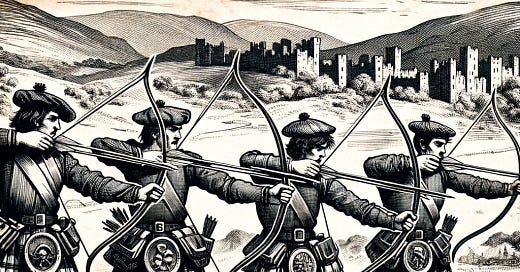The name "Fletcher" is synonymous with mastery of the bow, a legacy that stretches back to medieval Scotland. Rooted in the Burgundian French origin, the name Fletcher comes from the word "flechier," meaning an arrow-maker. This lineage of bowyers played a crucial role in the defense and warfare strategies of their time, carving out a significant place in Scottish history.
The Origin of the Fletchers
The Fletcher family traces its roots to the Canton de Vaud in Switzerland, once part of Burgundy, and now known for its breathtaking landscapes on the northern shore of Lake Geneva. From here, the family name and craft made their way to Scotland, establishing a legacy that would endure for centuries. The transition from "de la Flechiere" to "Fletcher" marked not only a change in geography but also an adaptation to the cultural and linguistic context of Scotland.
Arrival in Scotland
The first Fletchers to arrive in Scotland brought with them not just their name but a specialized craft—bow-making. The de la Flechiere family name was anglicized to Fletcher, reflecting their role in society as expert bowyers. The family settled in various parts of Scotland, contributing their skills to local clans and the broader Scottish community. This migration was likely influenced by the political and social upheavals of the time, driving skilled artisans to seek new opportunities in the burgeoning Scottish territories.
Mastery of the Bow
The Fletchers were renowned for their expertise in creating high-quality bows and arrows. This craft was not merely a profession but an essential service to the Scottish clans and their defense systems. The bows crafted by the Fletchers were known for their durability, precision, and power, making them indispensable in battles and hunting. Their meticulous attention to detail ensured that each bow was a masterpiece of engineering, capable of withstanding the rigors of warfare and providing consistent performance in critical moments.
The Role in Scottish Clans
Within the Scottish clans, the Fletchers' role was highly esteemed. Their bows and arrows were pivotal in clan warfare, where archery was a critical component of military strategy. The clans relied on the Fletchers' weapons for both offensive and defensive maneuvers, ensuring their survival and success in conflicts. The Fletchers' reputation spread across the Highlands and Lowlands, cementing their status as key contributors to the martial prowess of their adopted homeland.
The integration of the Fletchers into the clan system also meant that they became part of the social fabric of Scotland. Marriages and alliances with other notable families further embedded the Fletchers into the local nobility, enhancing their influence and securing their legacy for future generations.
Famous Fletcher Archers
One of the most notable mentions of the Fletcher family in historical records is William Fletcher of Cockermouth. He was a gentleman of significant station and consideration, whose son, Henry Fletcher, played a notable role during the turbulent times associated with Mary, Queen of Scots. Henry Fletcher's interactions with Mary, including his provision of a velvet robe during her imprisonment, highlight the family's prominence and their involvement in significant historical events.
The story of Henry Fletcher exemplifies the intertwining of the family's fortunes with the broader historical narrative of Scotland. As trusted figures, the Fletchers were often called upon to provide support and service to the ruling class, demonstrating their loyalty and reinforcing their status within the noble hierarchy.
The Fletcher Influence in Scotland
Beyond their military contributions, the Fletchers also played a role in the cultural and economic development of Scotland. Their skills in crafting bows and arrows were complemented by their involvement in agriculture and trade. The family owned extensive lands, where they implemented advanced farming techniques and contributed to the local economy.
Their influence extended into the religious and educational spheres as well. Members of the Fletcher family were known to support the establishment of churches and schools, reflecting their commitment to the welfare and advancement of their communities. This multifaceted involvement ensured that the Fletchers left an indelible mark on various aspects of Scottish life.
Legacy and Influence
The Fletchers' influence extended beyond their lifetime, with their descendants continuing the craft and maintaining the family’s esteemed position in Scottish society. The family’s dedication to bow-making and archery left a lasting impact, not just as a means of survival but as a celebrated art form. Their legacy can be seen in the continued reverence for traditional Scottish craftsmanship and the preservation of historical skills.
The ongoing reunions and gatherings of the Fletcher family serve as a testament to their enduring legacy. These events, which bring together descendants from around the world, celebrate the family’s rich history and ensure that the stories of their ancestors are passed down through generations. The shared sense of identity and pride among the Fletchers underscores the importance of family heritage and the bonds that connect them to their Scottish roots.
Conclusion
The Fletcher family’s legacy as master bowyers and archers is a fascinating chapter in Scottish history. Their skills in crafting bows and arrows provided critical support to Scottish clans, contributing to their defense and success in warfare. The story of the Fletcher archers is a testament to the importance of specialized crafts in medieval society and the enduring legacy of families who dedicated their lives to perfecting their trade.
From their origins in Burgundy to their establishment in Scotland, the Fletchers exemplify the resilience and adaptability of skilled artisans who played a pivotal role in shaping the course of history. Their contributions to the martial, cultural, and economic life of Scotland are a lasting reminder of the impact that one family can have on the world.





